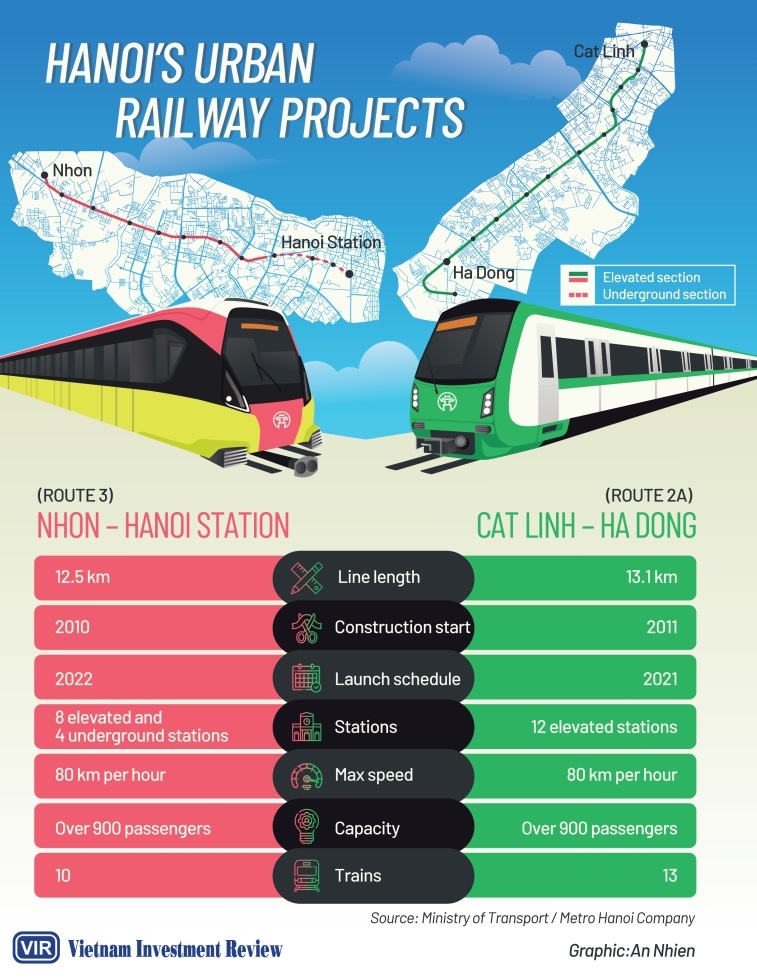The controversial Cat Linh-Hadong urban metro project has set its current deadline for commercial operation on April 30, with most stakeholder having mixed feelings of hope and doubt.
 |
Nguyen Nam, a 40-year-old living in Nguyen Trai street where the metro line is running through, told VIR, “Unlike with previous announcements, these days I can see the trains on the Cat Linh-Hadong line run almost every day. I hope this time the train will be operated on schedule. I have been waiting for years.”
Similarly, Hang Nguyen, a 38-year-old white-collar worker in Giang Vo street near Cat Linh – the starting point of the metro line – expects that people might be able to take the train in May.
“At first, when the train is actually operational, I will still ride my bike and wait for feedback about safety issues because the project has been sluggish for the last 10 years,” she said.
Such mixed feelings are common among Hanoians who witnessed several delays and hiccups within the first metro line’s schedule. On March 31, the Cat Linh-Hadong line had its construction and installation completed as announced by Nguyen Ngoc Dong, Deputy Minister of Transport, with the handover to Hanoi authorities currently taking place and expected to be completed in May.
Dong elaborated, “To complete the handover, the Ministry of Transport (MoT), Hanoi People’s Committee, the Railway Project Management Unit, and Hanoi Metro will work from March 31 with the Chinese engineering-procurement and construction contractor on checking receipts, dossiers, other documents, and assets. The works are expected to be completed in three to four weeks.”
In addition, the urban railway might need additional 107 employees for operation. According to Hanoi Metro, applications will be accepted until April 15.
Earlier in January, French consultant ACT gave 16 recommendations on risk prevention in the operation of the route, focusing on three groups of issues such as documents, design improvements, and readiness of human resources.
According to the MoT, some of these precautions have already taken place, such as fire prevention and fighting measures and a thorough analysis of the signal system. Other recommendations are related to measures to evacuate passengers in emergency situations and other critical issues.
There are still some recommendations given by ACT that will need more time to consider and be fulfilled, such as a system of glass walls to increase passenger safety. “The consultant’s recommendations are to ensure safety for passengers at the highest level, but not all must be fulfilled immediately,” the MoT leader said.
Despite the company’s job announcements, Hanoi Metro leader Dr. Vu Hong Truong reaffirmed that the needed employees to operate the trains is ready. He also added, “If the remaining works are done on schedule, we can operate in late April or early May.”
The construction of the Cat Linh-Hadong metro line was launched in October 2011 and originally scheduled for completion in 2013, with funding coming from Chinese official development assistance, with a total investment value of approximately $886 million after several adjustments.
The line has been a costly lesson for the MoT and other state management agencies. For Hanoi – a city of about nine million people, 5.2 million motorbikes, and around 550,000 cars – building more metro lines could be a relieve to ease pressure on urban traffic.
Deputy Minister Dong admitted that the project is huge and complicated, and has been carried out for many years, while the legal system, standards, and even price management mechanisms need further work.
“Lessons learned from this project is that for new things, it is better to study examples abroad and then do it. For future projects like this, we must have a better roadmap for both investment preparation and human resources training before implementation,” he noted.
|
The Cat Linh-Hadong metro line uses electric locomotives. The elevated line of more than 13.1km has 12 stations and 13 trains. Each train is designed to have four carriages capable of carrying a total of over 900 passengers at a speed of 80km per hour. Total human resources needed amount to 681 people. However, in the latest recommendation from ACT, more staff should be added to guide passengers at railway stations and ensure safety. On average, more than 50 staff serve 1km of the line. During the first 15 days of operation, passengers can travel free of charge. Afterwards, single tickets will cost VND15,000 (65 US cents) per trip, with monthly and quarterly tickets to be announced by Hanoi Metro. |
VIR

Cat Linh - Ha Dong urban railway trains to arrive every 6 minutes
When Hanoi’s Cat Linh - Ha Dong urban railway project is put into operation, every 6-10 minutes there will be a train arriving at the stations to pick up and drop off passengers.